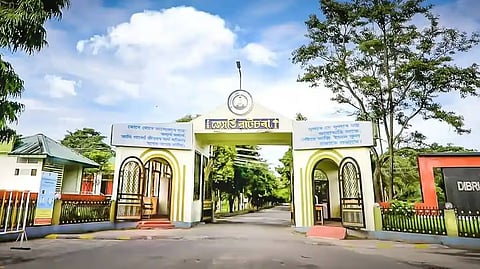
- Home
- Live Blog
- Breaking News
- Top Headlines
- Cities
- NE News
- Sentinel Media
- Sports
- Education
- Jobs

A CORRESPONDENT
DIBRUGARH: The Centre for Social Work Studies (CSWS), Dibrugarh University, in collaboration with North East India Water Talks (NEIWT), wrapped up an intensive seven-day training programme on water held from October 22 to October 28.
Supported by the Heinrich Böll Stiftung, New Delhi Office, and the North East Affected Area Development Society (NEADS), the programme drew 40 MSW students from the five Northeastern states of Assam, Arunachal Pradesh, Meghalaya, Mizoram, and Tripura.
Designed to deepen participants' understanding of the social, ecological, and policy dimensions of water, the week combined expert lectures, group work, and hands-on field exposure.
Sessions covered a wide spectrum of themes including urban water management and rainwater harvesting, groundwater contamination, aquatic biodiversity, water and disasters, gendered water concerns, climate-water linkages, and community-based water strategies.
The programme opened with a warm welcome from Prof Dolly Phukan, Dean of the Faculty of Social Sciences, Dibrugarh University. Dr Monuj Dutta, Assistant Professor at CSWS and convenor of the training, outlined the course objectives and emphasised the need for local, community-driven water solutions in the Northeast.
Distinguished resource persons who led sessions included Vishwanath Srikantaiah, widely known as the 'Rain Man of Bengaluru,' Dr Partha Jyoti Das (Head, Water, Climate & Hazard Division, Aaranyak), Prof Chandan Kumar Sharma (Tezpur University), Dr Rizwan Uz Zaman (Assam Climate Change Management Society), Girin Chetia (NEADS), Luit Goswami (Rural Volunteers Centre), faculty members from different disciplines of DU, and Mrinal Gohain (ActionAid).
A highlight of the programme was the field visit to Dodhiya village in the Dibru-Saikhowa National Park on October 26. Participants engaged with local residents to learn about water-dependent livelihoods, indigenous adaptation strategies, and the interplay between ecology, tourism and community resilience in an experience that brought classroom lessons vividly to life.
The closing day showcased the participants' reflections and group presentations proposing community-based water initiatives tailored to their home regions.
Also Read: Assam: Universal Brotherhood Day observed in Dibrugarh and Nagaon